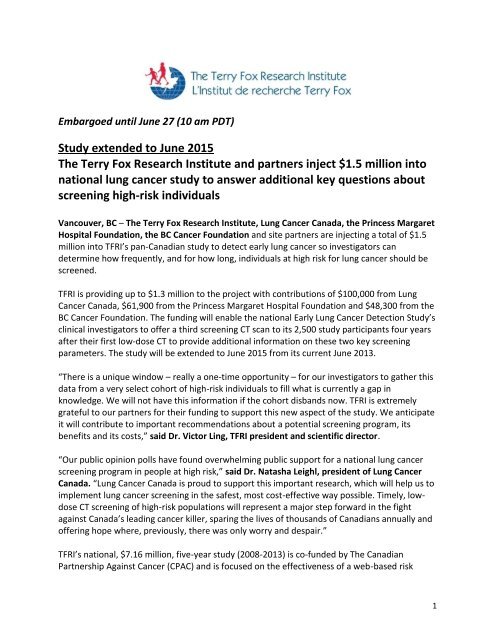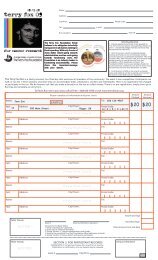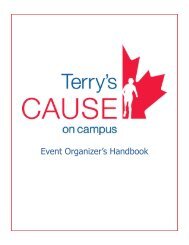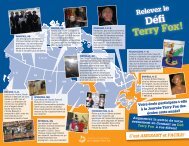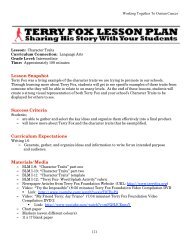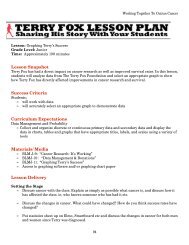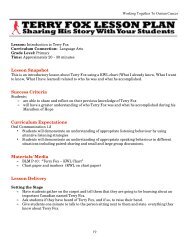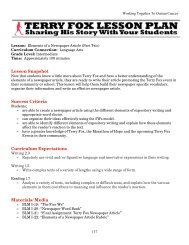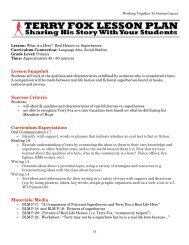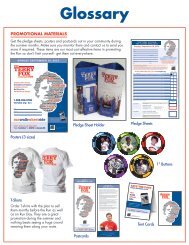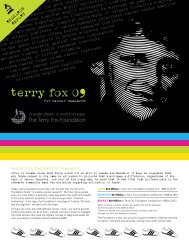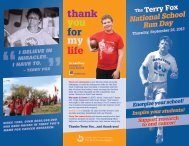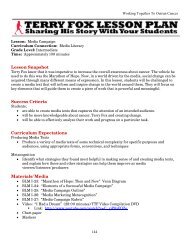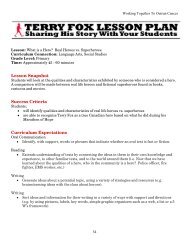June 27, 2013 - Terry Fox Foundation
June 27, 2013 - Terry Fox Foundation
June 27, 2013 - Terry Fox Foundation
You also want an ePaper? Increase the reach of your titles
YUMPU automatically turns print PDFs into web optimized ePapers that Google loves.
Embargoed until <strong>June</strong> <strong>27</strong> (10 am PDT)Study extended to <strong>June</strong> 2015The <strong>Terry</strong> <strong>Fox</strong> Research Institute and partners inject $1.5 million intonational lung cancer study to answer additional key questions aboutscreening high-risk individualsVancouver, BC – The <strong>Terry</strong> <strong>Fox</strong> Research Institute, Lung Cancer Canada, the Princess MargaretHospital <strong>Foundation</strong>, the BC Cancer <strong>Foundation</strong> and site partners are injecting a total of $1.5million into TFRI’s pan-Canadian study to detect early lung cancer so investigators candetermine how frequently, and for how long, individuals at high risk for lung cancer should bescreened.TFRI is providing up to $1.3 million to the project with contributions of $100,000 from LungCancer Canada, $61,900 from the Princess Margaret Hospital <strong>Foundation</strong> and $48,300 from theBC Cancer <strong>Foundation</strong>. The funding will enable the national Early Lung Cancer Detection Study’sclinical investigators to offer a third screening CT scan to its 2,500 study participants four yearsafter their first low-dose CT to provide additional information on these two key screeningparameters. The study will be extended to <strong>June</strong> 2015 from its current <strong>June</strong> <strong>2013</strong>.“There is a unique window – really a one-time opportunity – for our investigators to gather thisdata from a very select cohort of high-risk individuals to fill what is currently a gap inknowledge. We will not have this information if the cohort disbands now. TFRI is extremelygrateful to our partners for their funding to support this new aspect of the study. We anticipateit will contribute to important recommendations about a potential screening program, itsbenefits and its costs,” said Dr. Victor Ling, TFRI president and scientific director.“Our public opinion polls have found overwhelming public support for a national lung cancerscreening program in people at high risk,” said Dr. Natasha Leighl, president of Lung CancerCanada. “Lung Cancer Canada is proud to support this important research, which will help us toimplement lung cancer screening in the safest, most cost-effective way possible. Timely, lowdoseCT screening of high-risk populations will represent a major step forward in the fightagainst Canada’s leading cancer killer, sparing the lives of thousands of Canadians annually andoffering hope where, previously, there was only worry and despair.”TFRI’s national, $7.16 million, five-year study (2008-<strong>2013</strong>) is co-funded by The CanadianPartnership Against Cancer (CPAC) and is focused on the effectiveness of a web-based risk1
assessment model and simple breath and blood tests as a first step for detecting early lungcancer. To date, 4.6% of the participants have been diagnosed with cancer.“I’ve been receiving CTs annually since I first joined the study in 2008. I don’t think it’s anexaggeration to say that my participation in the study saved my life,” said Vancouver residentand study participant Mr. Chris Douglas, 65. He had a cancerous nodule, detected on an earlyCT, surgically removed in 2011. Today, he is an active swimmer and grandfather of two. Theformer smoker quit when he joined the study.“We already know our study is helping to save lives. This additional funding will enable us tocollect and analyze new data that will help us to evaluate screening for individuals with highrisk. It will also allow data from our study to more easily be compared with current studiesalready published, such as the National Lung Screening Trial,” said Dr. Stephen Lam, a leadinvestigator of the study, who is chair of BC’s Provincial Lung Tumour Group at the BC CancerAgency and a professor of medicine at the University of British Columbia. “We believe this newinformation will, potentially, save more lives and provide the health system with relevanteconomic data for the development of an effective and affordable way to implement a nationalscreening program.”The U.S. study found that low-dose CT scans were effective in reducing lung cancer mortality by20 per cent in a similar high-risk group.Currently, eight cities are involved in the Canadian study: Vancouver, Calgary, Hamilton,Toronto, Ottawa, Quebec City, Halifax and St. John’s. All will participate in the extended study.No new participants are being recruited.Preliminary study findings are expected within the next year.About TFRILaunched in October 2007, The <strong>Terry</strong> <strong>Fox</strong> Research Institute is the brainchild of The <strong>Terry</strong> <strong>Fox</strong><strong>Foundation</strong> and today functions as its research arm, managing its complete researchinvestment portfolio. TFRI seeks to improve significantly the outcomes of cancer research forthe patient through a highly collaborative, team-oriented, milestone-based approach toresearch that will enable discoveries to translate quickly into practical solutions for cancerpatients worldwide. TFRI collaborates with over 50 cancer hospitals and research organizationsacross Canada. TFRI headquarters are in Vancouver, BC. www.tfri.caAbout LCCLung Cancer Canada is a national charitable organization that serves as Canada’s leadingresource for lung cancer education, patient support, research and advocacy. It is the onlyorganization focused solely on lung cancer in Canada. For more information on Lung CancerCanada, please visit www.lungcancercanada.ca.Note to editors:2
B-roll (includes interviews) and photos of Dr. Lam and Mr. Douglas are available atwww.tfri.caMr. Douglas is available for interviews between 1-2 p.m. PDT on Thursday, <strong>June</strong> <strong>27</strong> at the BCCancer Research Centre. Please contact K. Curwin to arrange.Backgrounder availableFor more information, contact:Kelly Curwin, Chief Communications Officer<strong>Terry</strong> <strong>Fox</strong> Research Institute, Vancouver BCW: 604-675-8223C: 778-237-8158kcurwin@tfri.caArielle DensenLung Cancer CanadaT: 212-358-8515, ext.5adensen@tillerllc.comAlison ColinaBC Cancer <strong>Foundation</strong>T: 604.802.6984allison.colina@bccancer.bc.ca3
Background on Lung Cancer Lung cancer is the most common cause of cancer death worldwide, with more than 1.4million dying annually. In Canada some 20,000 die of lung cancer every year. If lung cancer is diagnosed and treated early, the outcomes can be significantlyimproved.In Canada, there is no public policy regarding lung cancer screeningThe National Lung Screening Trial (NLST) conducted by the U.S. National Cancer Institutefound a 20% reduction in lung cancer mortality with a low dose CT (rather than X-ray) insmokers age 55 to 74.Background on the TFRI Early Lung Cancer Detection Study The five-year study got under way in 2008 with a total of $7.16- million in funding fromTFRI and the Canadian Partnership Against Cancer (CPAC) The study participants are current and former smokers between the age of 50 and 75 The findings of the study have the potential to significantly reduce lung cancer mortalitythrough early cancer detection with relatively simple breath and blood tests It is hoped that the study findings will contribute to a change in clinical practice. Costs for study CTs have ranged from $200-300 each.4


